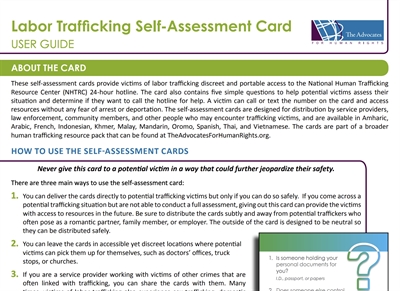Labor Trafficking Self-Assessment Card
Country: United States of America
Type: Tool or Factsheet
Issues: Human Trafficking, Workers' Rights
Guide for self-assessment card (PDF 300.6 KB)
Survivor self-assessment card - English (PDF 116.9 KB)
Survivor self-assessment card - Arabic (PDF 108.0 KB)
Survivor self-assessment card - French (PDF 512.6 KB)
Survivor self-assessment card - Indonesian (PDF 110.9 KB)
Survivor self-assessment card - Khmer (PDF 122.4 KB)
Survivor self-assessment card - Malay (PDF 110.2 KB)
Survivor self-assessment card - Mandarin (PDF 144.6 KB)
Survivor self-assessment card - Spanish (PDF 107.1 KB)
Survivor self-assessment card - Swahili (PDF 500.3 KB)
Survivor self-assessment card - Vietnamese (PDF 118.9 KB)
Created by a multi-disciplinary working group, the Labor Trafficking Self-Assessment Card provides workers with discreet and easy-to-carry information about labor trafficking.
The card contains five simple questions to help workers assess their situations and determine if they want to seek help and helps workers connect with the National Human Trafficking Resource Center 24-hour hotline (888-373-7888) where they can find out about help in their area.
- Is someone holding your personal documents for you? (I.D., passport, or papers)
- Does someone else control the decisions you make about your life? (Where you go; where you live; who you talk to; when you see your family; whether you take breaks at work; whether you work when you are sick or injured; or how you spend your money)
- Do you owe money to your boss, the person who hired you, or the person who helped you find the job? (Money is taken directly from your pay to cover a debt or for travel; the amount you owe increases; or the amount you owe does not decrease)
- Are you receiving all your pay? (Not paid at all; not paid on time; not paid as promised; or paid in housing, food, or other things but not money)
- Are you afraid something bad will happen to you or someone else if you leave your work?




